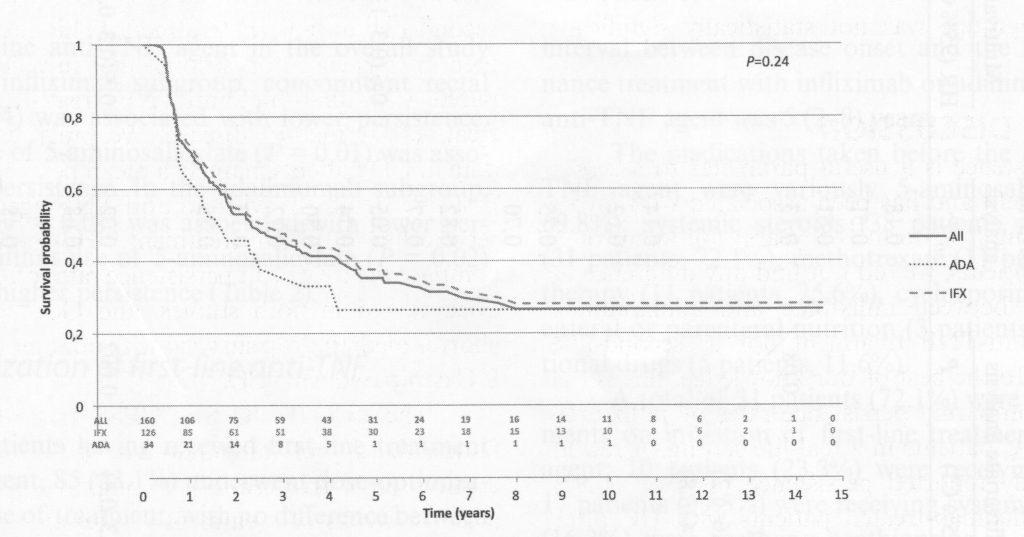When Remicade came out it was a breakthrough in treatment for patients with Crohn’s disease. Eventually it came to be recognized as a treatment for Ulcerative Colitis as well. We went through a time of using it while on mesalamine and azathioprine, then just Remicade alone, now back to with azathioprine at low dose, and perhaps now with mesalamine again.
Aside from how to best administer anti-TNF drugs it was found that patient’s immune systems could make antibodies against them. After all, the drugs like Remicade (infliximab) and Humira (adalimumab) are themselves antibodies and therefor are proteins. The patients’ immune systems see these as foreign proteins and therefor can develop an immune reaction against them. Infliximab and adalimumab were designed to minimize immugenicity. (Immunogenicity is the word that describes no stimulating something is to the immune system). However, the immune system responds very well to foreign substances. An immune reaction often develops.
Inflammatory bowel diseases are also the result of many aspects of the immune system driving a reaction. While Tumor Necrosis Factor is one of the control proteins of the immune system it is not the only one. A patient may have multiple drivers of their disease in addition to TNF. This probably explains why only about half of patients respond to Remicade in the first place.
Once a patient responds and is on infliximab or adalimumab will it work forever? Gastroenterologists find that after a few years patients may stop responding. Tests can be done to see if antibodies are forming or if the concentration of the drug is low. But sometimes the effectiveness of anti-TNF drugs just wanes.
Crohn’s patients have been treated the longest, since the anti-TNF drugs were first used in them. We see very long duration benefits of anti-TNF drugs in many patients with Crohn’s. A number of studies have looked at the time course of response in Crohn’s disease.
Ulcerative colitis has been treated with anti-TNF drugs for a lesser number of years, so there are fewer articles obout the effectiveness of anti-TNF drugs in ulcerative colitis. An article in IBD Journal, Treatment Persistence of Infliximab versus adalimumab in Ulcerative colitis: a 16 year single-center experience[1], addresses the issue.
In this study researchers at the Nancy University Hospital in in Nancy, France reported on the results of treatment of ulcerative colitis patients that had been on long term therapy for at least 6 months. They selected patients who were treated for UC with either infliximab or adalimumab. Patients treated just for pouchitis were not included and neither were patients who had just gotten intermittent doses.
They found 160 UC patients that fit the definition of chronic use of and anti-TNF for over 6 months. In that group 43 patients had started on one of infliximab or adalimumab and swithced to the other. On average, patients responded for about 3 years (3.1 years for infliximab and 2.1 years for adamimumab. Patients that were also on mesalamine drugs had a longer duration of response.
The telling graphic from the study is the analysis of time to failure of anti-TNF treatment, figure 2 in the article.

The label on the vertical axis “Survival Probability” means the proportion of patients for whom the anti-TNF drug continued to work, not time to death. The label could better have been “Proportion of patients still in remissiokn.” The number at the top is 1, meaning 100%.
Looking at the graph everyone was good for a few months, but then the drop-off is evident. While the average time of benefit was about 3 years, that includes the people with long term benefit. So for infliximab about half of individuals lost benefit at 2.3 years, and about 25% of patients had benefit that exceeded 10 years. For adalimumab, about half of individuals lost benefit at 1.7 years, but, similar to infliximab, about 25% had long term benefit.
This sort of data is very helpful in deciding on how to use anti-TNF medications. The study only looks at infliximab and adalimumab. Golimumab, certolizumab were not included, but those drugs are not as commonly used as infliximab and adalimumab in the treatment of UC.
The study is from an academic medical center, where patients are referred from the community, often sicker and less responsive than patients in the community. Thus, results may be worse than seen in community centers.
Reference:
1. Lieven Pouillon, Cédric Baumann, Hélène Rousseau, Myriam Choukour, Charlotte Andrianjafy, Silvio Danese, Laurent Peyrin-Biroulet, Treatment Persistence of Infliximab Versus Adalimumab in Ulcerative Colitis: A 16-Year Single-Center Experience, Inflammatory Bowel Diseases, Volume 25, Issue 5, May 2019, Pages 945–954, https://doi.org/10.1093/ibd/izy322